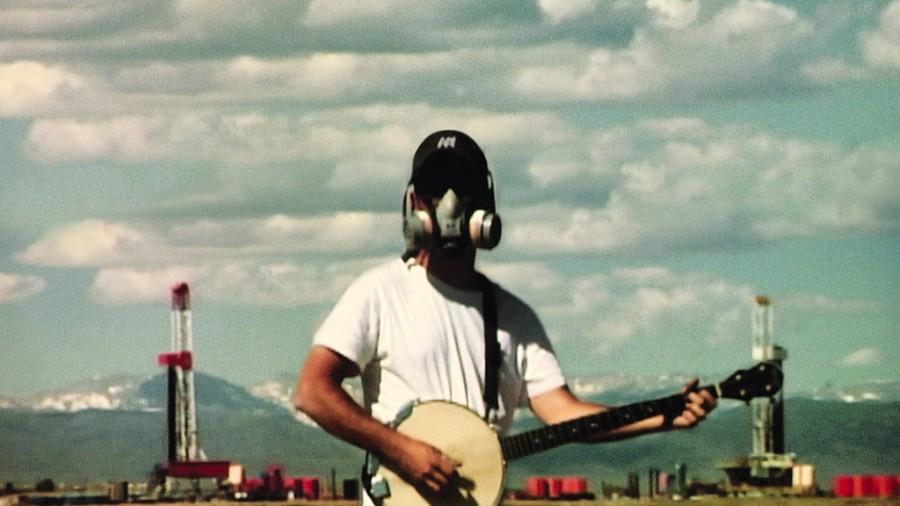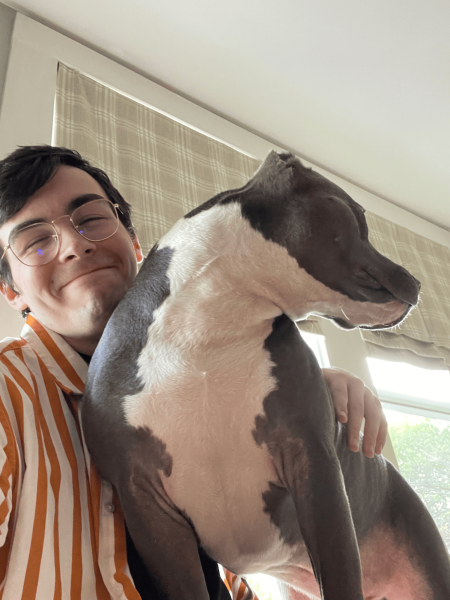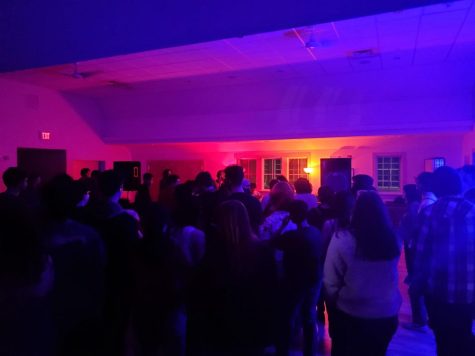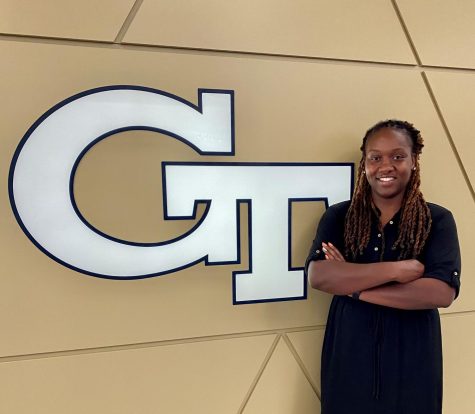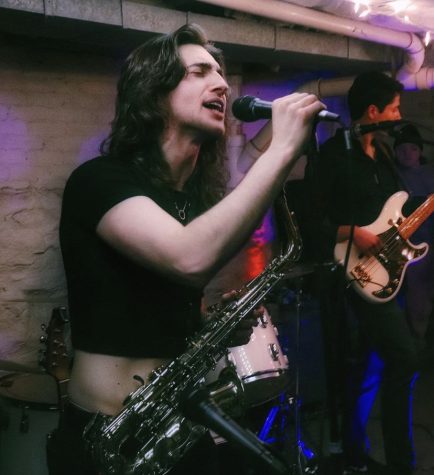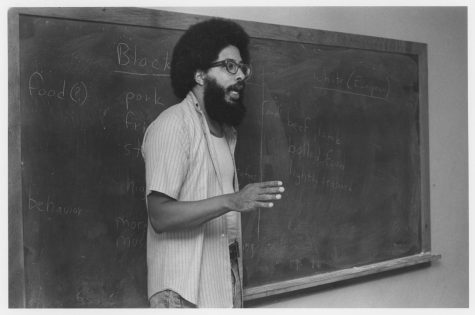Director of “Gasland” Josh Fox on Big Oil, Grassroots Organizing, and Yoko Ono
As part of the two-day Earth Day celebration, filmmaker Josh Fox visited the University of Massachusetts Amherst on Thursday, April 23 to speak about his documentaries on the hydraulic fracturing industry, better known as “fracking.” “Gasland” and “Gasland 2” chronicle the devastating effects fracking has on our environment, our health, and our country, giving us a sobering look at the natural gas industry’s insatiable search for profits.
I sat down with Fox to speak to him about his films and activism around the natural gas industry. Fox was inspired to make the film by his own brush with the fracking industry in his hometown of Milanville, Pa. In May 2008, Josh received a $100,000 offer from a natural gas company for the rights to drill on his land. Wary, he decided to investigate further and found that the same thing was happening all across the country — and it was bad.
Josh began filming his first ever documentary with an old camera and $3,000 dollars he raised himself. His cross-country road trip brought him from Wyoming to Colorado, Arkansas and Texas, all the while collecting stories from people harmed by the fracking industry.
“Gasland” was nominated for an Academy Award for Best Documentary in 2011 and has become the battle cry of the fracking movement. Fox’s work is equal parts activism and education, with a deep love for earth and all its inhabitants.
How did you get started making this film?
To me this felt so real, people have such a lack of information, this has to be a documentary even though I had never made a documentary before. I thought I could lend my sort of storytelling skills to this effort because my neighbors were going completely bonkers and insane worrying about losing everything. It became fairly clear that when the oil and gas industry was coming to town, they were coming to take over. This initial research said this is pretty scary. This involves hundreds of chemicals, toxifying the water supply which we all depend on, thousands of trucks, and industrial development polluting the air.
Who are the Damascus Citizens for Sustainability?
They are originally a mom-and-pop anti-fracking environmental organization that starts at someone’s kitchen. This one protects the Delaware River Watershed. Then you have hundreds of these organizations across New York and Pennsylvania, and thousands across the world. That’s what makes up the fracking movement. The movement did not start with the Sierra Club, the Environmental Defense Fund, or the Big Greens; it started with four or five people sitting around a table deciding to take this on.
I met with them and they were really, really, really concerned. Their water in their dishwasher had turned black. They could light their water on fire. Their kids were getting ill. Their animals were getting ill. They wanted to know what was going on and I said I don’t know but let’s talk about it. That really made this a priority for me.
How is your town doing now?
We won. We totally won. It happened ten days after “Gasland 2” came out. First, we won a moratorium at the Delaware River Basin. Where I live is the watershed area that is the Delaware River. There is an interstate compact between New York, New Jersey, Pennsylvania and Delaware and the federal government to monitor the watershed, so all decisions that have to do with that watershed have to go through the Delaware River Basin Commission. They were going to approve regulations in 2011, we stopped them. We were going to shut their meeting down. We had 5,000 people ready to go to jail and luckily at the last minute, they pulled the resolution.
But in 2013 something even better happened which was all the companies pulling out. They nullified their leases, almost 100,000 acres worth of leases; they were basically like “Uncle, we’re out of here. You guys are stronger than us. You win.“
The next piece that happened was that we won the ban in New York state. New York state banned fracking on December 17, 2014 which we didn’t think was going to happen.
Do you feel like “Gasland” was responsible for that?
“Gasland” made fracking a household word. It changed the general consciousness; but more effective in terms of the movement is the kind of thing we’re going to do tonight which is touring and speaking. I toured to about 300 cities with “Gasland” and “Gasland 2” directly to these mom-and-pop organizations. I give them the film and talk to the audience and do a Q&A and talk about grassroots campaigns.
They are part of a dual strategy. One is to build a big presence in the mainstream media, and the movie itself. And then you go and you vigorously campaign in the danger zone. I’ve done a hundred dates in New York and Pennsylvania alone where you are really rallying the troops and you’re getting them educated and you’re getting them involved, and saying you have to show up at this protest, write these comments and sign these petitions. That is constant and has been going on for six years.
Why did you make “Gasland 2”? What did you have left to say?
The first “Gasland” was really a survey of all the environmental contamination. Water pollution, air contamination, public health problems, degradation of the atmosphere, the truck traffic, and industrialization. The basic local and regional environmental impacts of fracking and drilling. So what you saw happen with “Gasland” was the fracking movement being born, becoming connected.
I had flown over the BP oil spill. It was the Fourth of July and it was a Sunday. We didn’t know what to expect, I was thinking we might see a little oil. On TV, you didn’t see much, but then all of a sudden we were there and I couldn’t believe my eyes. Oil everywhere. Why isn’t this on the news? It took us a long time to figure out. This is what spurred me on to make “Gasland 2.” I looked at it and thought, here is the biggest environmental catastrophe in the history of the United States. It is on the surface of the ocean. You can see it washing up on the shore, and we’ve managed to create a cover up and we’ve managed to make it more toxic by spreading dispersants. And where the fuck is Obama? Why hasn’t he come out swinging? I was completely confused.
I thought, if this is the way they are handling BP, so ineptly, how are they going to deal with fracking when all the contamination is underground. You can’t see it. How is this going to work? I was terrified.
What really motivated me was when I looked into the history of oil and gas and its influence on U.S government. That question became the premise for “Gasland 2.” It is about another layer of contamination, not in the water and not in the air, but in the government. Every piece of influence that the oil and gas industry has, how do we investigate that? This is something that no one wanted to talk about. None of the politicians are going to be like yes, look at all the corruption that I have right here. We had to track that through lobbying expenditures, influence, and reports. We found that at every level of government, whether it was state, local, or federal, you had a profound influence from the oil and gas industry on politicians. So much so that it no longer felt like we were in a democracy. The influence of the oil and gas industry was greater than that of the public.
I went to D.C. to the White House last week and said what the hell are you guys doing on offshore drilling? They want to open up the Atlantic to offshore drilling and I said I can’t believe we are even talking about this. This is like a headline in the Onion; “Obama opens up the Atlantic for offshore drilling on anniversary of BP oil spill.”
Unfortunately we have come to the conclusion that they are not on our side, they think they can have it both ways. As much as the first “Gasland” was about Dick Cheney and big oil, “Gasland 2” is about Obama and our incredible disappointment with a guy we love in a lot of ways who’s really failing on this topic.
What was it like meeting the victims of fracking?
Well everyone has the same story. Their water goes bad, something goes wrong with someone’s health in the community, toxic emissions flood their house, property values plummet. They all are living in an industrial hell that wasn’t that way before. After a while you hear that story over and over again and it gets very difficult. At the same time, as a reporter, that is what you want to see.
They are all my friends still. There are many different schools of making documentaries. Some people jump out from bushes and throw a camera in your face. I hate that shit. I think its dehumanizing to yourself. I call people on the phone and if they say they don’t want to talk to me, like the oil and gas industry did, we just let people know that they refused to appear in the film. But I think of this process as a friendship.
Do you have a role model?
Albert Maysles, who is my hero who just passed away, made groundbreaking documentaries — Grey Gardens, Salesman, and Gimme Shelter. Some of these films that changed the face of documentaries. I met Al at Yoko Ono’s birthday party.
You went to Yoko Ono’s birthday party?
Yeah I got an award from Yoko Ono. She is a good friend of mine. I love her to death. She is one of my favorite people on the whole planet. She is one of those people who is so maligned and so not respected. The whole thing about her breaking up the Beatles is total nonsense. Yoko is responsible, in my opinion, for influencing John in a political direction. He wasn’t political before her. Her artwork is incredible. She was one of the first punks ever. She is like a walking haiku. She’s, like, so smart. She is 82 years old. She still tours and plays an incredible show. She is one of my all-time heroes.
I was lucky enough in 2010 to have gotten an award from her because her and John Lennon’s farm is in the way of the Constitution Pipeline in upstate New York. So she created Artists Against Fracking with her son, Sean Lennon, in 2012. I was one of their main advisors to help with all the science and everything. They gathered 180 artists to be against fracking like Lady Gaga, MGMT, and Wilco and every band you’ve ever heard of.
I made a short film of their tour to Dimmick called Artists Against Fracking. I also made another short called The Sky is Pink, which explains how science news get distorted in the media.
What is the problem that activists need to focus their energy on?
There is a legacy of oil and gas having influence on the government. That has been there for a hundred years. At the same time, you see this incredible upsurge in the influence of corporations on our politics because of Citizens United. You’re seeing that as a huge problem, and Obama has a lot of power to ban fracking on federal lands, for example, to influence the tone of the argument here.
So Obama has gone out and said he wants to campaign on climate change. Which is fantastic, he’s the first president to do so. At the same time, he is supporting fracking which is a form of climate denial. He wants to have it both ways but we are too far gone for that. We can’t be talking about exploring new areas of oil and gas, we know that all the oil and gas that is in the ground is too much to burn in the first place.
That is what the whole divest movement is about. Making sure that 80% of the known fossil fuel reserves stay in the ground. There is an article that Bill McKibben wrote in Rolling Stone that details what we need to do. To stay within the 2 degree Celsius limit that we can warm our planet, we can only burn 565 gigatons of carbon dioxide. Right now, the fossil fuel industry is saying that they have enough fossil fuel reserves to burn ten times that. It’s really scary stuff.
What can students do?
As a student in college, divestment is huge. Tell them, “Okay, you’re ostensibly preparing us for the future, so it makes no sense to be investing and profiting off the very thing that will deprive us of a future.” That’s a total contradiction in terms. You might as well give us a degree and walk away. For an institution of higher learning to say we don’t care about the future is insane.
On the fracking issues, I think right now in Massachusetts there are many pipelines being proposed through Massachusetts that will take gas from Pennsylvania and Ohio to market and sell overseas. That can’t happen. We definitely need pipeline fighters in Massachusetts right now. If there are other antifracking organizations on campus, I urge people to join them and get educated.
People think of the environment as an issue. It’s not an issue — it’s where you live. It’s your home. If you have no clean air and if you have no clean water, it’s not an issue anymore, it’s about survival. People who are in the environmental movement understand this in a very fundamental way. And I think its something everyone needs to be involved in to a certain degree.
I can tell you right now joining the fracking movement you become friends with people from all across the earth. If you are a fracktivist and you go to South Africa, Germany, or Australia you will find people fighting for the same things. It’s a global movement. The ramifications are global, but the good part is the community is global.
If you want to find out how to get involved in your area visit www.gaslandthemovie.com and sign up for alerts at www.solutionsgrassroots.com.
Email Sarah Robertson at [email protected], or follow her on Twitter @srobertson__.

